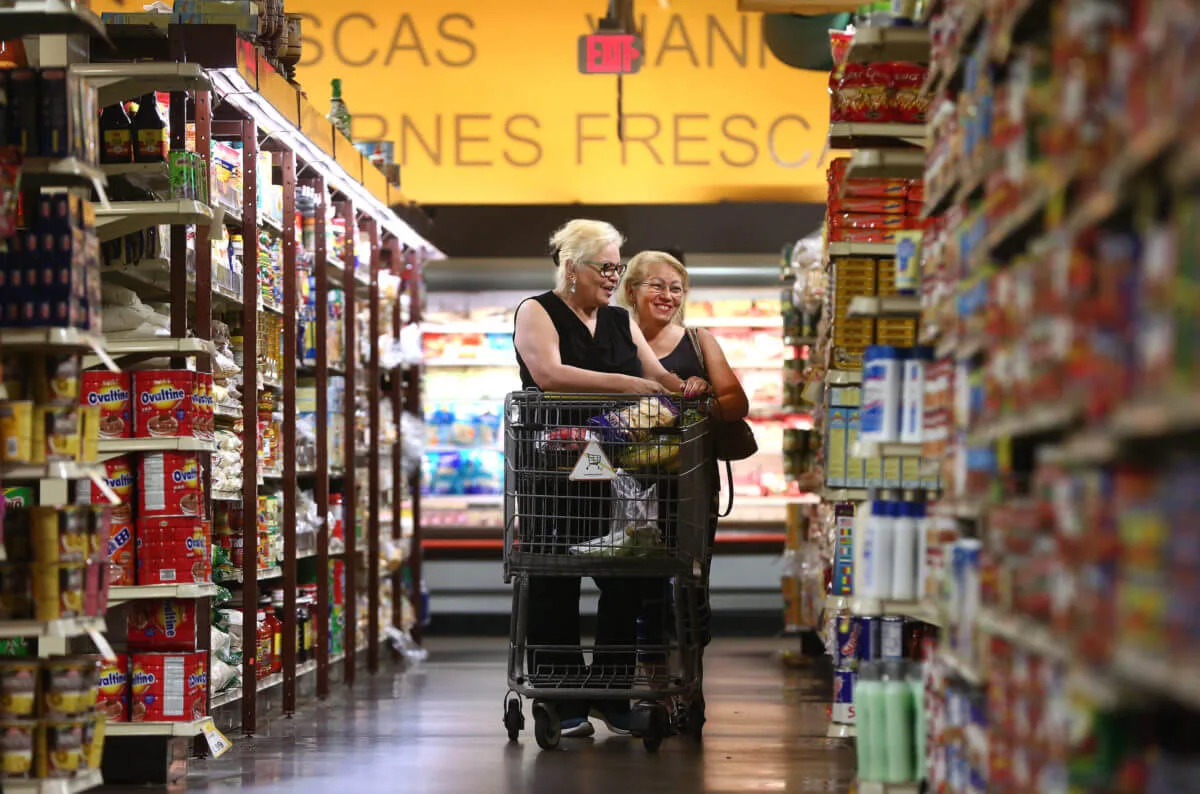
Sisters Cruz Sanchez, left, of Mattapan, and Frances Rosado, of Dorchester, shop at Tropical Foods in the Roxbury neighborhood of Boston on Aug. 22, 2017. The locally owned store caters to a mostly immigrant and largely low-income population. (Photo by Pat Greenhouse/The Boston Globe via Getty Images)
The proposal was met with criticism from anti-poverty and anti-hunger advocates and policy experts who called it “callous and cruel” and said it would only make it more difficult for people to find work.
A federal judge on Sunday struck down the Trump administration’s attempt to end food assistance benefits for nearly 700,000 unemployed Americans.
In a blistering 67-page ruling, Chief US District Court Chief Judge Beryl Howell criticized the US Department of Agriculture (USDA) for failing to justify or even acknowledge the impact its effort to slash Supplemental Nutrition Assistance Program (SNAP) benefits would have had on states.
The pandemic exposed how flawed the administration’s proposed changes were, Howell said, citing an estimate which found that more than 6 million Americans had enrolled in SNAP—sometimes referred to as food stamps—between February and May. That equates to a 17% increase in enrollees.
The USDA has been “icily silent about how many [adults] would have been denied SNAP benefits had the changes sought … been in effect while the pandemic rapidly spread across the country,” Howell wrote. The proposed change “radically and abruptly alters decades of regulatory practice, leaving States scrambling and exponentially increasing food insecurity for tens of thousands of Americans,” she added.
Sorting Fact From Fiction: Sign Up for COURIER’s newsletter.
Howell concluded that the USDA’s “utter failure to address the issue renders the agency action arbitrary and capricious.”
The proposed rule, which was first finalized by the USDA in December 2019, would have tightened work requirements for SNAP recipients for an estimated 688,000 unemployed, “able-bodied” adults between the ages of 18 and 49 who don’t have dependents. Currently, these individuals are only eligible to receive SNAP benefits for a maximum of three months during a 36-month period, unless they work or participate in a work training program for at least 20 hours per week.
But in order to allow for flexibility during economic downturns, states have been allowed to waive this time limit in individual counties where the 24-month average unemployment rate was at least 20% above the national average, or where there was a lack of jobs. Counties with unemployment rates as low as 2.5% have qualified for waivers under the current system.
RELATED: 6 Million Signed Up for Food Assistance During the First 3 Months of the Pandemic
Under the proposed rule, however, the minimum unemployment rate for a county to receive a waiver would have been 6%, making it more difficult for states to provide the waivers.
In announcing the change last year, USDA Secretary Sonny Perdue said changes were intended to lay “the groundwork for the expectation that able-bodied Americans re-enter the workforce where there are currently more job openings than people to fill them.”
The proposal was met with criticism from anti-poverty and anti-hunger advocates, policy experts, and many Democrats who called it “callous and cruel” and said it would only make it more difficult for people to find work.
RELATED: 700,000 Americans Could Lose Food Stamps in April. We Spoke to One of Them.
“There are proven ways to help people find work, and taking food away from individuals makes them no more ready to find a job or secure a job,” Robert Campbell, managing director of policy at Feeding America, a nonprofit hunger relief organization, told COURIER earlier this year.
Howell previously issued a preliminary injunction against the rule in March, and Congress waived the work requirement for the duration of the emergency as part of its coronavirus relief legislation. The Trump administration also suspended its planned April implementation date, but appealed the judge’s order with the goal of implementing the rule whenever the emergency ends.
Howell’s ruling, which comes as an estimated 8 million Americans have slipped into poverty since May, delivers a victory to the coalition of 19 states, the cities of Washington, D.C., and New York City, and private organizations that sought to stop the rule.
Jennifer Mezey, deputy legal director for the Legal Aid Society of the District of Columbia, which filed suit on behalf of private clients, praised Sunday’s ruling.
“We are so pleased that the Court struck down this heartless rule, the implementation of which would have cruelly exacerbated the increased hunger and hardship that our client community is experiencing as a result of this once in a generation pandemic,” Mezey said in a statement to COURIER.
New York Attorney General Letitia James also celebrated the ruling while simultaneously blasting the Trump administration for even issuing the rule in the first place.
“At a time of national crisis, this decision is a win for common sense and basic human decency,” James said in a statement. “This Trump Administration rule was cruel to its core and ran counter to who we are and what we represent as a nation. If implemented, this rule would have not only made it harder for thousands to feed their families and risk them going hungry, but would have exacerbated the public health crisis we face and the economic recession we are still in the midst of under President Trump’s lack of leadership.”
The USDA had not issued a public statement on the rule as of press time, and the Trump administration could still appeal the ruling to the circuit courts.
The rule, which was expected to save the government $5.5 billion over five years, is one of three Trump administration proposals designed to restrict access to food stamps. If all three rules were to be implemented, an estimated 3.7 million people would lose their food stamp benefits according to a study by the Urban Institute. Millions more would see their benefits slashed, and nearly one million students would lose automatic access to free or reduced-price school meals.
READ MORE: The US Is on the Verge of a Massive Hunger Crisis. Here’s One Mom’s Story.
Politics

Influencers and creators find new ways to engage young Philadelphia voters
Rec Philly, a space for creators and influencers, teamed up with Show Up Strong to get hundreds of young Philadelphia residents engaged in the...

New Biden rule protects privacy of women seeking abortions
Under the new rules, state officials and law enforcement cannot obtain medical records related to lawful reproductive health care with the goal of...

Biden marks Earth Day by announcing $7 billion in solar grants
The Biden administration on Monday announced the recipients of its Solar For All Program, a $7 billion climate program that aims to lower energy...
Local News

Conjoined twins from Berks County die at age 62
Conjoined twins Lori and George Schappell, who pursued separate careers, interests and relationships during lives that defied medical expectations,...

Railroad agrees to $600 million settlement for fiery Ohio derailment, residents fear it’s not enough
Norfolk Southern has agreed to pay $600 million in a class-action lawsuit settlement for a fiery train derailment in February 2023 in eastern Ohio,...






